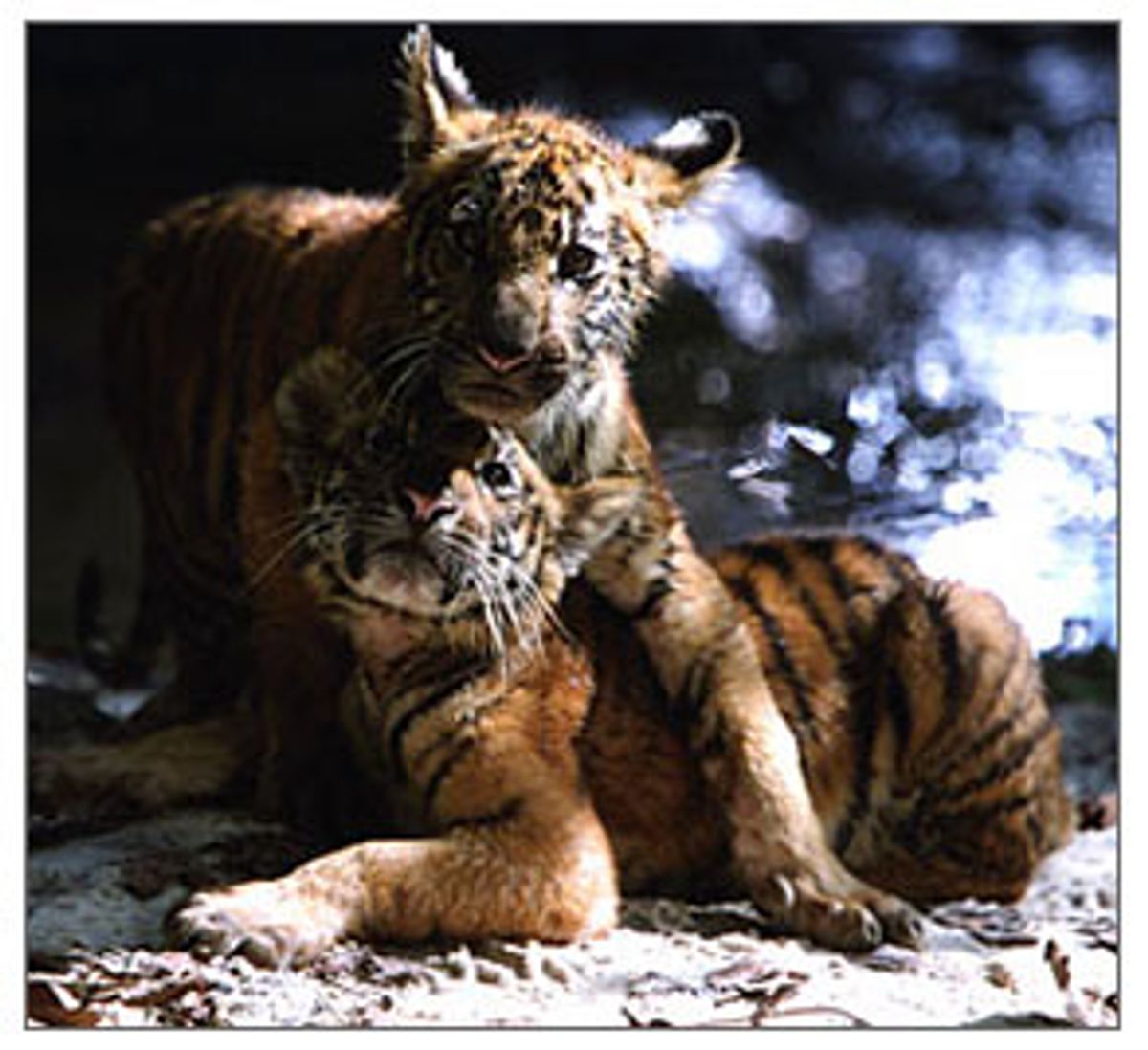Unless you're a lover of tigers, there's probably no reason to see Jean-Jacques Annaud's "Two Brothers." And maybe not even then: There are numerous instances of fraught, melodramatic tiger endangerment and/or death (a father tiger is shot and killed; a circus tiger is beaten; cubs look on winsomely as bad stuff happens around them), and while the worst of it occurs, tastefully, off-screen, it's still enough to make you feel as if you've been pulled through a wringer of fire by the end.
But "Two Brothers" is noteworthy because it represents a kind of fevered moviemaking insanity that we rarely see these days: Annaud ("The Bear," "Quest for Fire") seems to have no sense of an audience's baloney limit -- he just keeps flinging it out there, slice after slice, with a degree of sincerity that almost defies comprehension. The picture's first five minutes give us two noble but randy tigers getting it on in a deserted Buddhist temple (located, it seems, somewhere in early 20th century Cambodia or Thailand) festooned with lush, verdant growth: Sunlight streams in as the deities, in statue form, look on serenely and approvingly as life is created; bouncy deer leap and frolic here and there, alert to the tangy perfume of animal eroticism that fills the air. (I swear I'm not making this up.) The tiger cubs are born, and they do stuff like chase a hardened piece of fruit down a hill -- pay close attention, because this motif will be echoed later in the film. Suddenly, Guy Pearce shows up, tanned and fit in a pair of khaki jodhpurs: He's Aidan McRory, an English hunter and stealer of religious artifacts (he spirits mighty bronze statue heads away to London, where he sells them for big bucks) who travels with a host of native servants and a gramophone. When he puts on a scratchy classical-music recording, both the docile servants and the tiger family, safely hidden in their nearby temple, nod off to sleep, lulled by the sounds of civilization.
Then the harrowing adventures begin. The tiger dad is shot, and while the mother escapes with cub No. 1, cub No. 2 is left behind. McRory rescues and befriends him, feeding him honey-drop candies crushed up in water from a canteen, and you have to hand it to Pearce: Instead of allowing himself to be upstaged, he allows the cub to bring out the best in him as an actor. Even though McRory has been trained to kill tigers, not suckle them, the little guy (he will later be named Kumal), with his puffy paws and inherent jungle dignity, wins him over. The two become fast friends.
They also, unfortunately, become separated, although the honey drops will always symbolize their special bond. Meanwhile, the other cub, who is named Sangha, has some tense adventures of his own. After spending a few blissful weeks as the pet of a small boy (he hides on the kid's toy shelf, tucked among the stuffed animals; he sleeps in the kid's bed, his head cradled on a pillow, a nippled milk bottle stuck in his mouth), he upsets the household by doing something unintentionally naughty and is sent away to become part of a prince's menagerie.
If that's not crazy enough for you, there's also a fat town bigwig (Jean-Claude Dreyfus) who struts around purposefully in a white uniform -- no movie set in colonial times is complete without one. The bigwig has a French wife (Philippine Leroy-Beaulieu), who, in a story line the movie introduces but never follows up on, becomes entranced by McRory. In one scene, she reads one of his adventure books to her son at bedtime, and her erotic excitement mounts as the story of pursuit and conquest heats up; once the kid is asleep, she closes the book and lovingly caresses McRory's picture on the back.
Who makes this stuff up? In this case, we have Annaud (who, in addition to directing, wrote the screenplay with Alain Godard) to blame. And you have to give him at least a little credit: The picture reaches and sustains a level of nuttiness that few modern movies would dare to attempt. No matter what, though, the chief draw of "Two Brothers" are the tigers, Kumal and Sangha. Annaud, shamelessly, gives them unrealistically human characteristics, but their true animal nature always claws its way through. With their soulful faces and chiseled haunches, they're superior beings, barely ruffled by the ridiculousness around them, much less brought down by it. Annaud can draw as many crazy circles around them as he wants: They jump through with ease, always landing on their feet with a haughty sneer. They can't be bought with all the honey drops in the world.



Shares